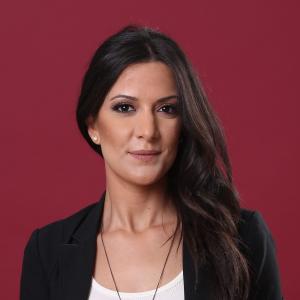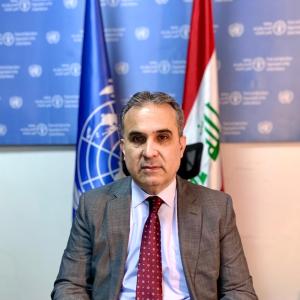Empowering Southern Iraqi Dairy Producers: FAO-EU Initiative Delivers Vital Equipment in Southern Iraq
19 May 2024

Basra, Iraq, May 19, 2024
Implemented by the Food and Agriculture Organization of the United Nations (FAO) in close collaboration with the Ministry of Agriculture (MoA), the "Restoration and Strengthening the Resilience of Agri-Food Systems in Southern Iraq" project enters a new phase with the launch of the first batch of dairy equipment distribution in Basra, Thi Qar, and Missan, targeting 5000 beneficiaries (50 % of whom are women).
This transformative initiative aims to uplift dairy production standards and improve the livelihoods of rural communities in Southern Iraq. By developing the milk production chain, the initiative empowers rural women's groups in the marshes to improve their livelihoods through increased productivity and marketing potential of local dairy products. Additionally, modern machinery is introduced to further strengthen the resilience of these communities.
Led by FAO representative in Iraq, Dr. Salah El Hajj Hassan, and the technical Deputy of MoA, Dr. Mithaq El Khafaji, these two distribution ceremonies held respectively at the agricultural training and extension centers in Basra and Thi Qar saw the presence of key dignitaries including representatives from the ministries of Agriculture, Planning, Environment and Water Resources, the National Department for Iraqi Women as well as representatives of local government, farmers’ association and beneficiaries .
Officials attending the ceremonies expressed gratitude for FAO's efforts amidst challenging conditions, highlighting the transformative impact of modern equipment in fostering resilience and sustainable agriculture in Southern Iraq. They reaffirmed their commitment to supporting ongoing initiatives, recognizing the importance of sustained collaboration in advancing agricultural resilience in the region.
The distributed equipment included essential dairy tools to enhance milk hygiene standards and production efficiency.
This initiative signifies a substantial step forward in promoting sustainable agriculture, empowering local communities, and enhancing livelihoods, and those two ceremonies represent the kick-off of a wider equipment distribution campaign that will cover the three southern governorates during the upcoming month.
Dr. Salah El Hajj Hassan expressed his enthusiasm, stating, "Today marks a crucial moment in our efforts to empower rural communities and promote sustainable agriculture in Southern Iraq. The distribution of dairy equipment underscores our commitment to improving milk hygiene standards and enhancing the livelihoods of dairy producers, particularly women. We also extend our thanks to partners at the European Unions as well as national and local partners who contributed to the success of this initiative, recognizing the collaborative efforts that have made this endeavor possible."
Dr. Mithaq Al Khafaji, emphasized the project's significance, saying, "This initiative aligns with our vision to strengthen the resilience of rural communities and promote sustainable agriculture. By providing essential dairy equipment, we aim to improve the quality of milk production and contribute to the economic empowerment of rural households. The government is committed to providing further support to buffalo producers and farmers in the South, underscoring our dedication to fostering agricultural development and prosperity in the region."
Alongside with the distribution ceremony, officials took part in a field visit to marshlands to follow up on the situation of buffalo producers and witness positive developments thanks to the sustainable interventions and support provided by FAO Iraq and the EU.
Additionally, the FAO team organized a workshop for Date Palm and Tomato Farmers Field School (FFS) facilitators from southern Iraq. This workshop ensured the development of date palm and tomato value chains. Ongoing activities were tracked, and plans were made for the upcoming crop season, focusing on production, processing, and marketing.
Under the broader umbrella of the EU Agri-Food Business Development Programme, the project, aims to improve governance and job creation along several agri-food value chains in Iraq. This initiative represents a major stride in fostering sustainable agriculture, empowering women, and strengthening agri-food systems in Southern Iraq.
Furthermore, this initiative aligns with several Sustainable Development Goals (SDGs), including SDG 1 (No Poverty), SDG 2 (Zero Hunger), and SDG 5 (Gender Equality). By promoting economic empowerment, food security, and gender inclusivity within rural communities, it not only addresses immediate challenges but also contributes to the overall sustainable development agenda. This holistic approach underscores the continuous commitment of FAO and its partners in supporting and sustaining the Southern rural communities.


He started his career in 1984, as Senior Research Assistant in the Agricultural Research and Education Centre (AREC), American University of Beirut. From 1987 to 1991, he was Coordinator of the Student Training Programme, and also Agriculture and Horticultural Teacher for the Faculty of Agriculture, at the Lebanese University.
From 1991 to 1995, he worked as Agricultural Engineer at the Ministry of Agriculture, Bekaa Regional Office, Zahlah and was then assigned to the Agricultural Research Institute in the Tal Amara station, first as Head of the Crop Production Department and subsequently in charge of the Plant Protection Laboratory. From 2002 to 2006, he was Director of the Kfardane Research Station (Agricultural Research Institute). In 2008, he became Visiting Scientist at the International Maize and Wheat Improvement Centre (CIMMYT) and Coordinator of a project with the International Centre for Atomic Energy Agency, Vienna.
In 2010, he served as Advisor to the Minister for Agriculture of Lebanon. In 2011, he became President of the Pesticide Scientific Committee, Head of the Phytoplasma Committee and Director of the Agriculture and Rural Development Programme (ARDP) (EU-funded project). From 2010 to 2013, he represented Lebanon in negotiations with EU, Egypt, Jordan and Iraq. During his career, Mr Hajj Hassan also carried out a number of other functions. He represented the Lebanese Agricultural Research Institute (LARI) in several research programmes with the International Centre for Agricultural Research in the Dry Areas (ICARDA) and the American University of Beirut. He was Coordinator of the Mashreq/Maghreb project with ICARDA, representing Lebanon in the Steering Committee, as well as being the Head of the Sugar-beet Delivery and of the Wheat Delivery Committees. For a number of years, Mr Hajj Hassan worked for the preparation of FAO TCP projects and served as the National Director of a TCP project. He joined FAO in January 2014 as FAO Representative in Yemen. Mr Hajj Hassan succeeds Mr El Zubi as FAO Representative in Iraq.


